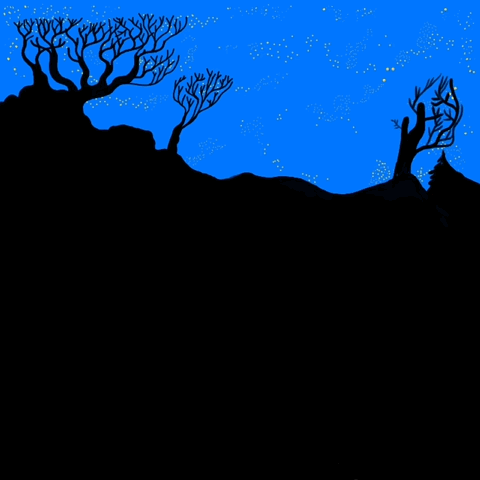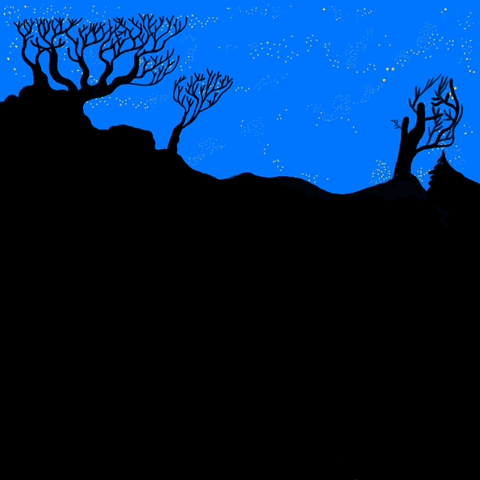A Solstice for the Rest of Us
Sunday Assembly celebrates its religion-free winter holiday with songs, rituals, and hopes for the coming year




When the Chapel Hill, North Carolina, chapter of Sunday Assembly gathered on the morning of Dec. 12, it looked like almost any other church’s holiday service: There was a congregation and music, and parents quietly reminding their young children of the order of events and rituals in which they were about to partake. What was conspicuously absent from the Sunday Assembly Solstice Celebration 2021: any mention of God. It was a secular solstice for the rest of us, a religion-free, winter holiday gathering of people who, according to their motto, want to “Live Better. Help Often. Wonder More.”
Sunday Assembly is a global movement started by two British comedians, Sanderson Jones and Pippa James, who discovered on a road trip to a gig that they both “wanted to do something that was like church but totally secular and inclusive of all—no matter what they believed.” They began their experiment in London in 2013, but there are now congregations around the world, “where people sing songs, hear inspiring talks, and create community together in a family-friendly and inclusive setting.” Today, according to various Sunday Assembly online statements, there are between 40 and 50 congregations worldwide.
At a state park picnic shelter in Raleigh on a bright, 50-degree Sunday morning in December, an eight-piece band of four singers and four acoustic guitar players welcomed me warmly before launching into a rehearsal of “Jingle Bells,” followed by other festive classics they would perform during Solstice Celebration. The songs included other standard holiday fare, such as “Deck the Halls” and “The Christmas Song” (appearing simply as “Chestnuts” on the lyric sheet given out to attendees). In this way it differs from Secular Solstice, another ritual-focused, nonreligious December observance founded by Raymond Arnold from the Rationalist online community Less Wrong, which features original music with humanist lyrics.
I approached a man named Adam, one of the early arrivals, as he perused the materials at the welcome table, which had not only the song sheets, but large green Sunday Assembly car decals bearing their motto and triangular logo. There were also “Life Happens” cards, which in a religious setting, would probably be prayer requests (“Write down the news you want to share with the Sunday Assembly community [...] so that we can all celebrate each other’s successes and offer comfort for each other’s difficulties”). Adam isn’t a regular; he said he enjoyed his first visit a few years ago. He’s “been looking around,” he said, for something with ritual, and has tried several churches in what he described as an “ongoing search.”
While another early-arriving congregant gathered sticks to feed it, a fire crackled behind the Sunday Assembly band, which only recently reconvened to practice together since the COVID-19 pandemic began. To most people raised in a churchgoing milieu, the cheerful banter and gentle jokes between the musicians as they geared up for their solstice celebration would be familiar. As the preparations continued, the woman who came with Adam offered me a blanket, saying I looked cold. Whether or not they believe in a higher power, these were church people.
The difference between Sunday Assembly and most traditional houses of worship was thrown into stark relief when a good-natured older man in glasses at the microphone started practicing “You’re a Mean One, Mr. Grinch,” a decidedly nonreligious holiday song of which the Grinch is the sole subject, and which doesn’t even mention Christmas by name.
As befits an entity conceived by two standup comedians, Sunday Assembly doesn’t take itself too seriously.
As befits an entity conceived by two standup comedians, Sunday Assembly doesn’t take itself too seriously, at least in Chapel Hill. There are the name tags worn by the volunteer organizers, some of which display the wearer’s pronouns, but all of which have colorful graphics and accompanying whimsical sobriquets like “Head of Unicorn Division, Aquatic Sector” and “Huggable Rogue.”
The volunteer-run nature of the organization is, it maintains, a fundamental part of what makes Sunday Assembly work. What in a formal religion might be termed a creed, volunteer leadership is one of the six pillars of Sunday Assembly Chapel Hill, along with being nonreligious (“we don’t do supernatural, but we won’t tell you you’re wrong if you do”), radical inclusivity, multigenerational membership, and the activities of secular group singing, fun talks, and events.
Head organizer Sam Anderson opened the Sunday Assembly Solstice Celebration by reading a summation of the group’s mission. It’s something he said they do at every assembly, with the wording unchanged in the four or five years since he joined. The wording is nearly identical to that found on other cities’ Sunday Assembly websites, forming a sort of nonreligious liturgy.
“Sunday Assembly is a secular congregation that celebrates life,” Anderson read to the group. “We are born from nothing and go to nothing. Let’s enjoy the time in between together.”
The opening text explains there is no Sunday Assembly doctrine, nor does it have prescribed texts, “so we can make use of wisdom from all sources.”
These are not atheists of the militant, Richard Dawkins variety. “Everyone is welcome, regardless of your beliefs—this is a place of love that is open and accepting,” Anderson read, “We won’t tell you how to live, but will try to help you live as well as you can.” The Sunday Assembly community, he read, is “interested in celebrating the wonder of life, and in making the most of the one life we know we have.”
Anderson explained to everyone that while there is usually a speaker at an assembly, since the theme of the day’s gathering was reflection, the focus would be more inward-looking, to the members of the community gathered there. After encouraging attendees to fill out their Life Happens cards at any point during the assembly, the band kicked off its first performance in around 18 months.
As the band played, the vaulted timber ceilings of the park shelter almost evoked the roof of a small country church, with the stone chimney fireplace behind them standing in for what might otherwise be an altarpiece. After renditions of “Jingle Bells” (as they appear on the sheet, the lyrics included the apocryphal verse about Batman, Robin, the breakdown of the Batmobile, and the Joker’s ensuing escape) and “The Most Wonderful Time of the Year,” Anderson spoke once again before introducing an icebreaker, in which assembly members broke off into smaller groups to talk about their winter traditions.
In the group I joined, after an initial quiet start, people began to share. Initial studious attempts to deploy more secular words like “holiday” were eventually largely abandoned, with one family saying they watch a Christmas movie on Christmas Eve (“usually Jingle All the Way”). Another attendee described an elaborate blindfolded gauntlet to retrieve the presents from their stockings.
We won’t tell you how to live, but will try to help you live as well as you can.
Next, a longtime Sunday Assembly organizer shared a reading of the Billy Collins poem “As If to Demonstrate an Eclipse.” She said she chose the poem in lieu of one explicitly about the winter solstice, since she felt it was too cold and dark for North Carolina at noon, even in December. Although not solstice themed, it had “astrological references,” she said, and dealt in the theme of gratitude for the appointed times and seasons that constitute the rhythms of life in the natural world.
After a couple more songs from the Sunday Assembly band, Anderson once again addressed the members of the group, who were all wearing the requested protective masks. He offered a meditation on solstice, a “time when things start to turn around,” and invited everyone to quietly reflect about the past year, pointing out a couple things that have altered life in the past 12 months. Most of us probably weren’t vaccinated this time last year, he said, and last December, the 2020 election results still hadn’t been certified. He then invited Sunday Assembly members to close their eyes if they wanted to, and to think about the things they “might want to carry forward” into the next year.
An additional minute of sharing followed, during which Anderson asked attendees to tell each other “that bit of joy” that they were going to want to remember from the year. A friendly woman named Adrienne came up to me, noticing I was alone, and asked if I’d like to share with her. After I explained I was there as a neutral observer, I invited her to share with me instead. She said she’s been attending Sunday Assembly for four or five years, and having grown up Catholic, she considers herself agnostic now. She said she liked the routine and community Sunday Assembly brought, since those things are not necessarily part of what she called “the atheist or agnostic experience.” “It can be lonely,” Adrienne said.
Community is “something that church does really well,” said another Sunday Assembly member. A former Christian, now nonbeliever, who has been attending for about six years, he said that when he started coming to Sunday Assembly, there was a sense that he had “found my people.”
Flannery O’Connor is known for saying that “while the South is hardly Christ-centered, it is most certainly Christ-haunted.” This group of around 30 people in the heart of North Carolina’s Research Triangle would certainly be out of place in one of O’Connor’s Southern Gothic stories. However, if they are not necessarily Christ-haunted (Anderson said in an email he “was raised in a humanistic Judaism congregation, Kahal B’raira, in Boston”), many seem religion-haunted. And that places them within a broader trend.
Even as traditional religious attendance declines in the U.S. and Europe, ritual is everywhere. There are ritual designers for organizational cultures. An op-ed in The Times of London recently suggested the Church of England stanch the flow of members out of the religion by simply embracing the rituals and traditions that people loved, rather than worrying about faith and doctrine. A self-help genre instructs readers on adopting the principles of monasticism to establish routine and practice mindfulness. They’re marketed as ways to increase our productivity.
The final ritual before the announcements (in itself a kind of de facto ritual at most church services) was the sharing of Life Happens cards, when the hopes and fears of the year were gathered in the picnic shelter at Umstead State Park. Anderson read them out, and the congregation responded sympathetically, celebrating with those who had good news. If the members of Sunday Assembly Chapel Hill have a sense of humor, they are no less earnest for it.
Before a potluck and games began, the band had one final song: “This Year,” by the Mountain Goats, described to the assembly as a song about “growing and looking ahead to the future,” a “shout of ‘I’m gonna make it!’” After a disclaimer that the band did not endorse the instance of underage drinking and driving in the lyrics, they began.
Mostly unmasked joggers and casual strollers passed the little shelter, which shaded us from the sun on what was a largely cloudless day.
“I am going to make it through this year,” the band sang through their masks, “if it kills me.”
This story is part of a series Tablet is publishing to promote religious literacy across different religious communities, supported by a grant from the Arthur Vining Davis Foundations.
Maggie Phillips is a freelance writer and former Tablet Journalism Fellow.